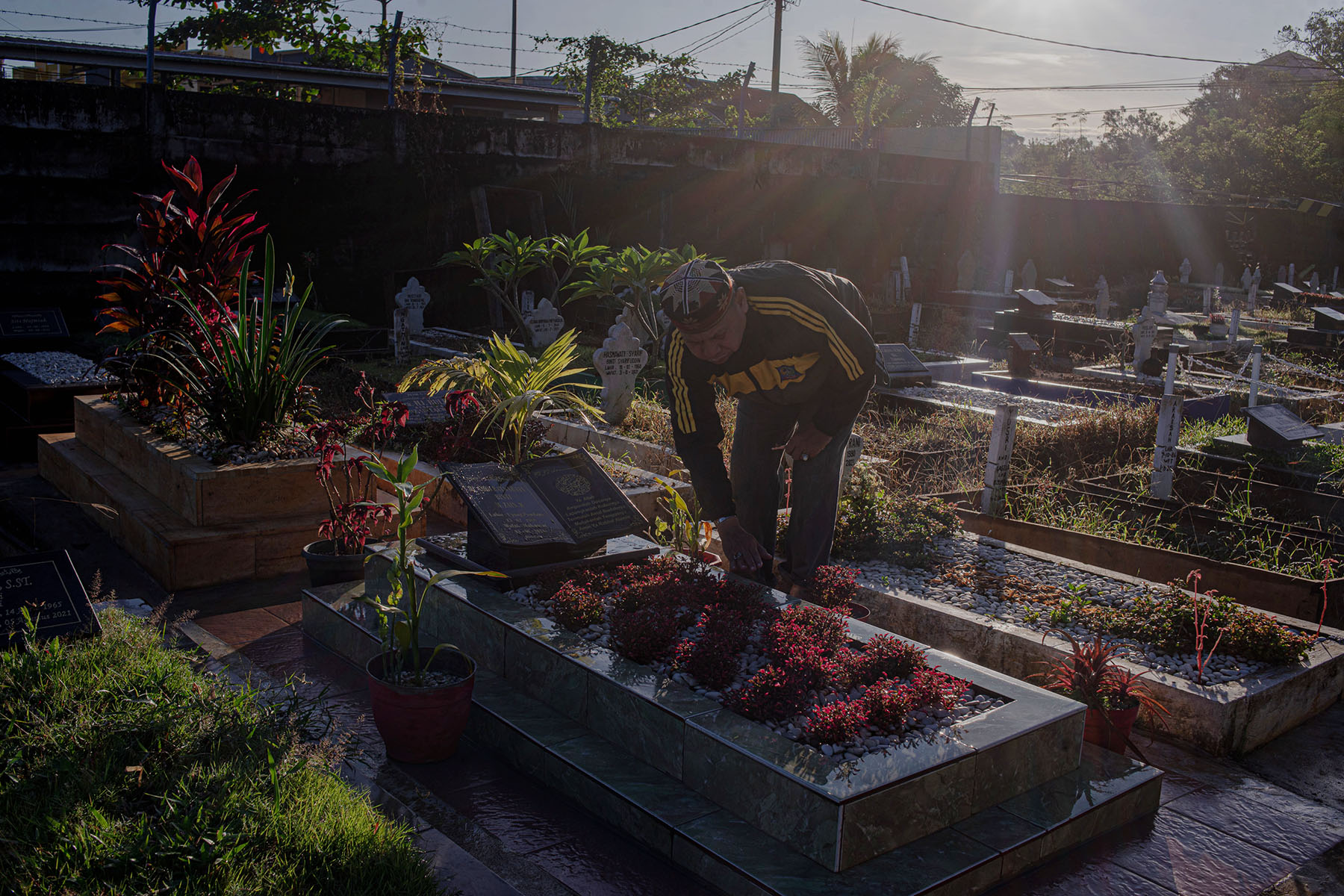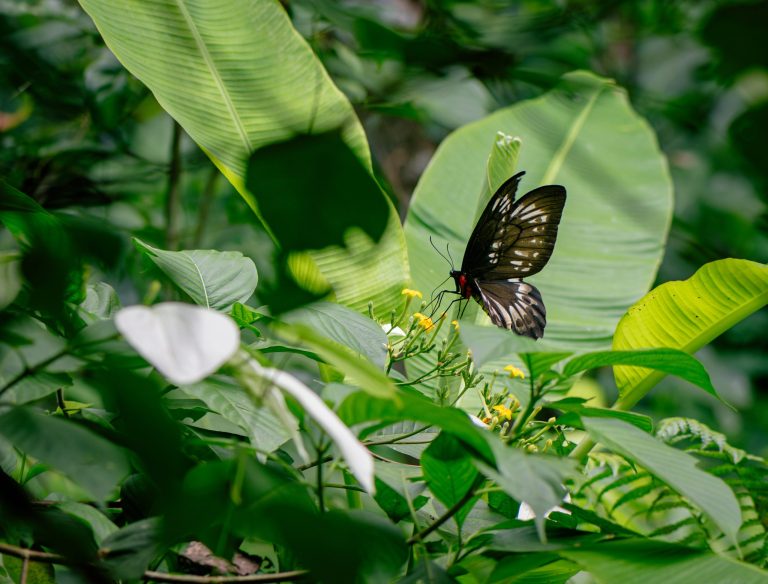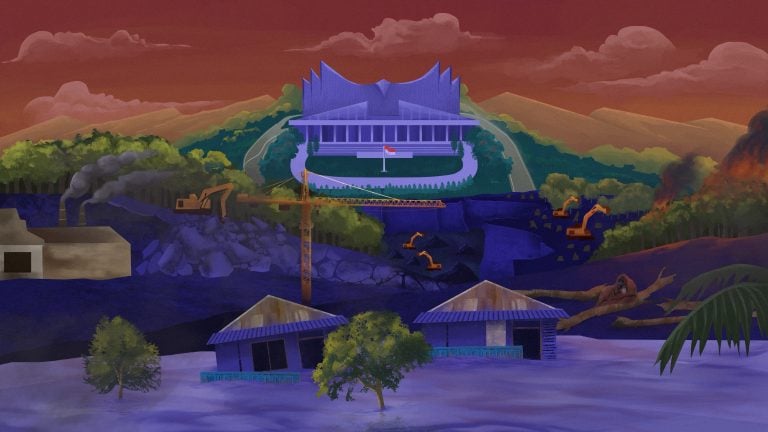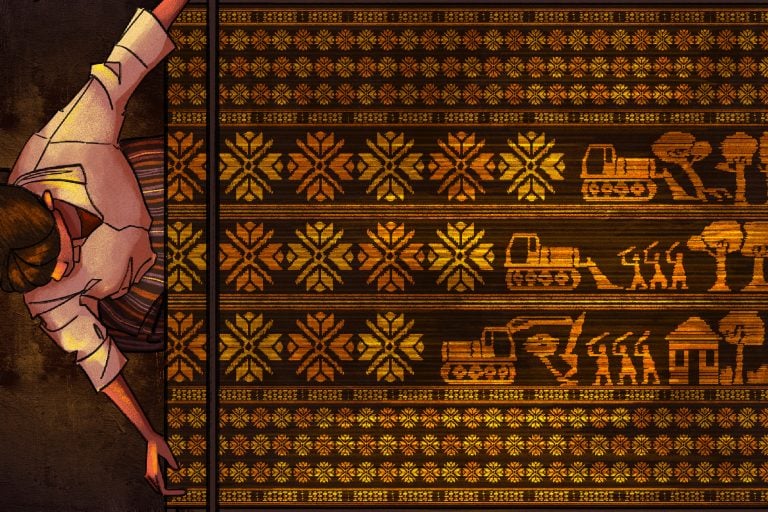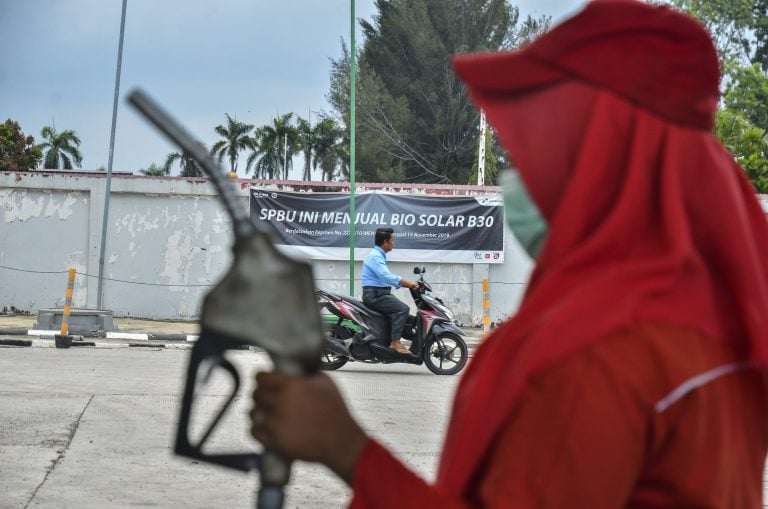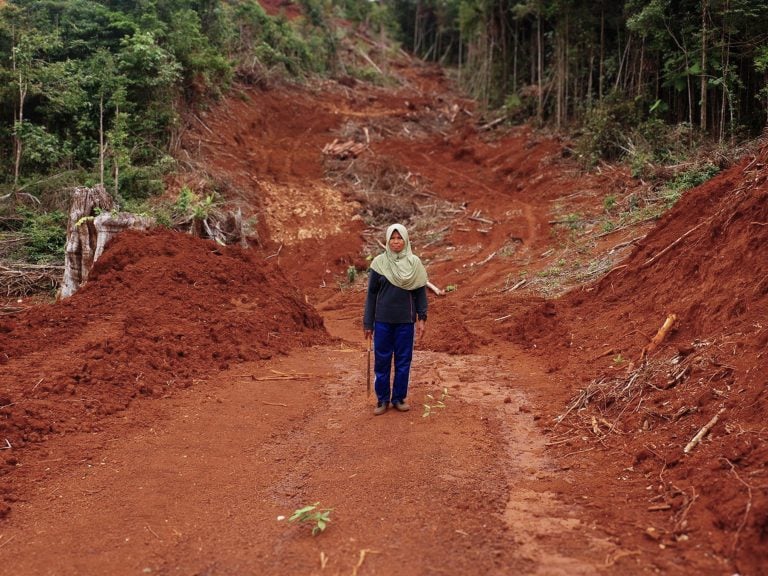The graveyard of sorrow – that is how people refer to the Macanda public cemetery in Gowa, South Sulawesi, where 1,338 people who died of Covid-19 between 2020 and 2021 were laid to rest. One of them was a 5-day-old child who died in March 2021. Others passed away without their loved ones around, separated by the health protocols that sought to protect them.
‘Losing the one’
Visiting the cemetery has become a daily routine for 65-year-old Masnun Basri, who lost his wife, Andi Ratnawaty, to Covid-19 on Aug. 4, 2021. He comes every morning before 5:30 a.m., just after dawn prayers, and reminisces in silence about the happy days he shared with Andi in their 38 years of marriage.
“Death is in the hands of God. But feelings and love are human,” Masnun said.
A black stone sculpture of an open book with Andi’s name carved in it stands firm at the top of the grave. Before, in its place was a tiled gravestone, which Masnun has since brought home for a memorial to Andi in his garden.
“In the morning, after returning from her grave, I will sit by her memorial at home. It helps me feel a little calmer,” he said.
At home, Masnun’s love is also encoded in a poem he wrote to his late wife printed on a large banner. It is on display on a wall, readily seen by guests. A red rose was taped next to the poem, entitled “No Tears for the Death, but the Process”.
“It’s not the death that took my other half away,
that sends me to tears, but it is the process of reuniting
with her and the memories of living with her for over 40 years that make the tears stream down my face subconsciously,” read the first few lines of the poem.
The loss was apparent in the silence of Andi’s absence. The couple had three children, two of whom have married, leaving only their youngest child living with Masnun.
“My wife has passed away, and we can’t cook, so now we buy prepared meals,” he said.
Masnun has been forced to befriend the silence in the couple’s bedroom, where they used to exchange stories, never running out of topics. Andi’s compassion and patience, Masnun said, allowed her to counsel him in all his problems.
“What should I say? The feeling of losing the one is beyond words,” Masnun said.
Remembering her sometimes left him reeling, he said, but he was committed to keeping his wife in his mind until death, which had set them apart, eventually reunited them.
“As she has passed away, and I’m still alive, I have to always remember her, always, until my own death comes.”
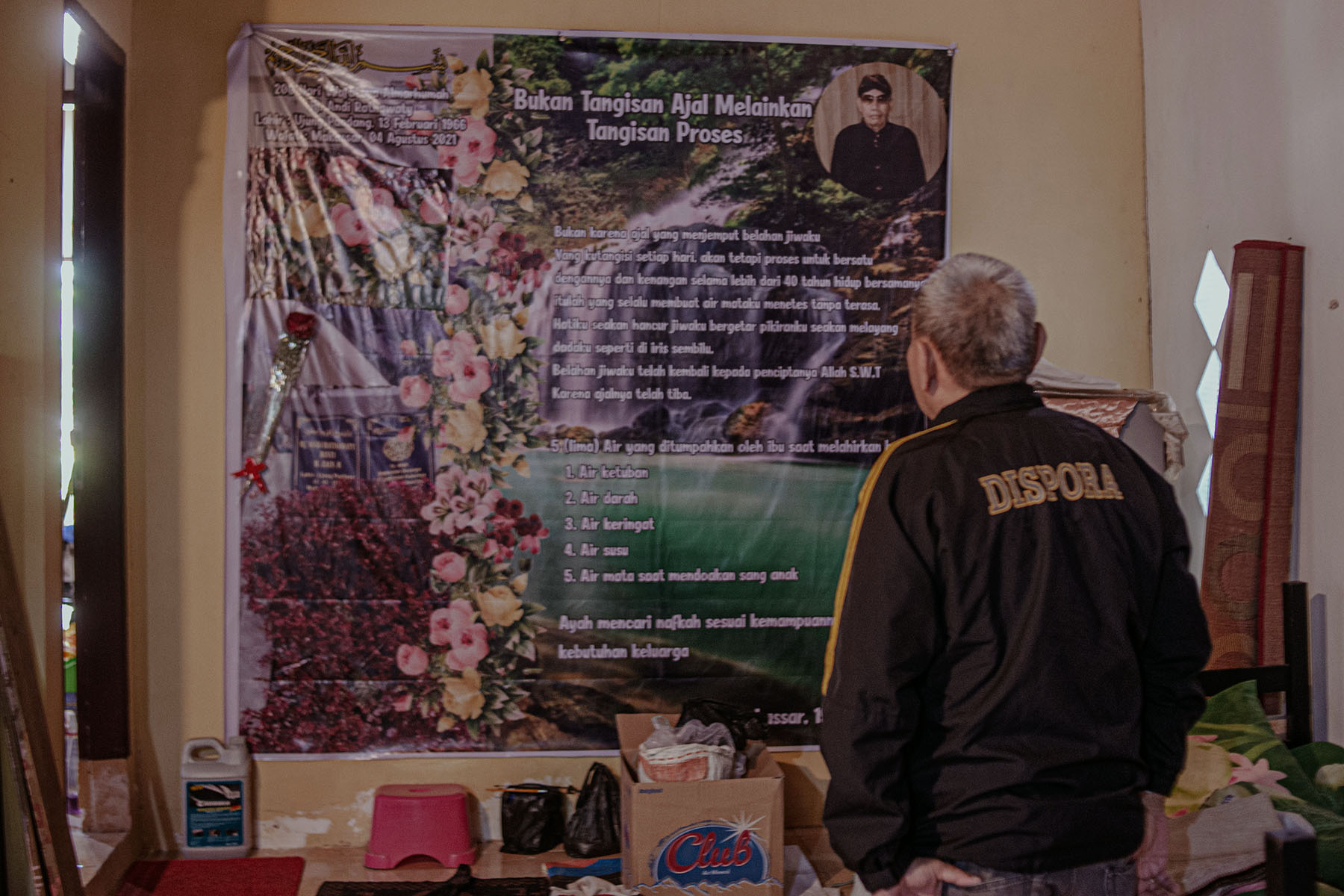
Since the beginning of 2022, when Covid-19 cases started to die down, visitors like Masnun have been flocking to the cemetery day and night.
Before, they were only permitted to watch the burial of their loved ones at the gate of the cemetery because of health restrictions. When the peak of the pandemic made death an all-too common experience, grave diggers in the cemetery buried as many as six people a day.
“If all the families’ tears were collected, they would fill up a whole basin. It was truly saddening,” said Rijal, the cemetery’s Covid-19 coordinator.
‘No one by her side’
In one corner of the cemetary, Quranic verses from YouTube could be heard from a visitor’s phone. It was 68-year-old Sahabuddin’s. He was seated next to his wife’s grave, brushing dust off the gravestone. His wife, Saerah, passed away on Jan. 3, 2021.
“I’m heartbroken. I do have regrets because she passed away far from the embrace of her kids and myself. There was no one by her side. No one could come to see her,” said Sahabuddin, who is a retired employee of state-owned oil and gas firm Pertamina.
Saerah had been suffering from diabetes and kidney stones. Just a year before the pandemic, she went through a fifth major surgery and had been taking insulin before each meal. She received her insulin for free from Pertamina.
When the pandemic hit, insulin distribution was shifted to the Awal Bros hospital in Makassar, South Sulawesi. Saerah, at her old age, feared visiting the hospital because of the possibility of catching Covid-19. She put off her use of insulin and resorted to medicines available at pharmacies.
In December 2020, Saerah complained of pain from the surgery scars on her back. Her sugar levels had also shot up. She had to go to the hospital. There, she received treatment in the isolation ward, before eventually being admitted to the intensive Covid-19 treatment ward. As Sahabuddin and his children drove their car to the hospital, a doctor called to let them know that Saerah had passed away.
“Why do I come [to the cemetery] every day? It’s because of my love for her,” he said. “I can’t focus on my daily activities if I don’t come here.”
The couple met in Makassar’s Karebosi field, where students used to have physical education classes. He was 21 and she was 17.
“I saw her, and I fell in love instantly,” Sahabuddin said. They have two sons and two daughters.
“It’s been a year [since her death], and it feels very different from before. I spent decades with her, then we were separated like this. How can I even put it into words?”
Missing half
Eddy Wibowo died on Aug. 2, 2021, just 10 days before he would have turned 52. His wife of 14 years, 43-year-old D’andra, recounted how his Covid-19 symptoms worsened sharply in just a few days.
Two days after attending a friend’s funeral, he developed a fever and cough and decided to isolate himself in a separate room of the family home. The next day, he felt worse and took a polymerase chain reaction (PCR) test. Two days later, his test came back positive for Covid-19.
Eddy then self-isolated alone in a rented house across the street, separated from D’andra and their 9- and 8-year-old children. When Eddy left for the hospital five days later due to declining oxygen saturation, D’andra could only send him off from the gate of the house. That was the last time she saw him alive.
Three days later, a doctor called and asked her to come to the hospital.
“The following day, he passed away without a ventilator. I felt like half of me had gone missing,” D’andra said.
Eddy passed away at 11 p.m. and was buried in Macanda at 3 a.m. the next morning. D’andra requested a delicate brown coffin for her husband.
The lights from the ambulance pierced through the pitch-dark night. When D’andra and her two family members walked into the cemetery, they saw that Eddy’s grave had already been dug with an excavator. Grave diggers in white personal protective gear hoisted Eddy’s coffin, which was wrapped in transparent plastic, all its corners tied tightly.
When the coffin reached the bottom of the grave, D’andra took a few steps closer and said her prayers. It was a swift burial process, none of the typical solemn rituals observed before the pandemic, not even scattering soil on top of the grave.
Ever since that day, D’andra has been visiting Eddy’s grave, never missing a day. She generally comes between 8 and 10 a.m. and between 4 and 6 p.m.
On the grave, just before the cross, were flowers that she said she changed periodically along with other plants that she watered. She put some small figurines of angels among the cross and plants, and two owl figurines stood guard over the grave. There were also solar-powered lamps to light up the headstone at night. The pathway to Eddy’s grave had been paved with cement to prevent it from getting muddy in the rain.
“I take care of his grave this way to make it look like a garden, so it’s pleasing to see,” she said.
In the rain or heat, D’andra sits by the grave, talks to her late husband and prays for him, sometimes under an umbrella. She also plays fishing videos on her phone, as Eddy was an avid angler.
“Sometimes I tell him that I don’t want to visit his grave. But then I come anyway, again and again,” she said. “I’ll keep coming as long as I’m healthy.”
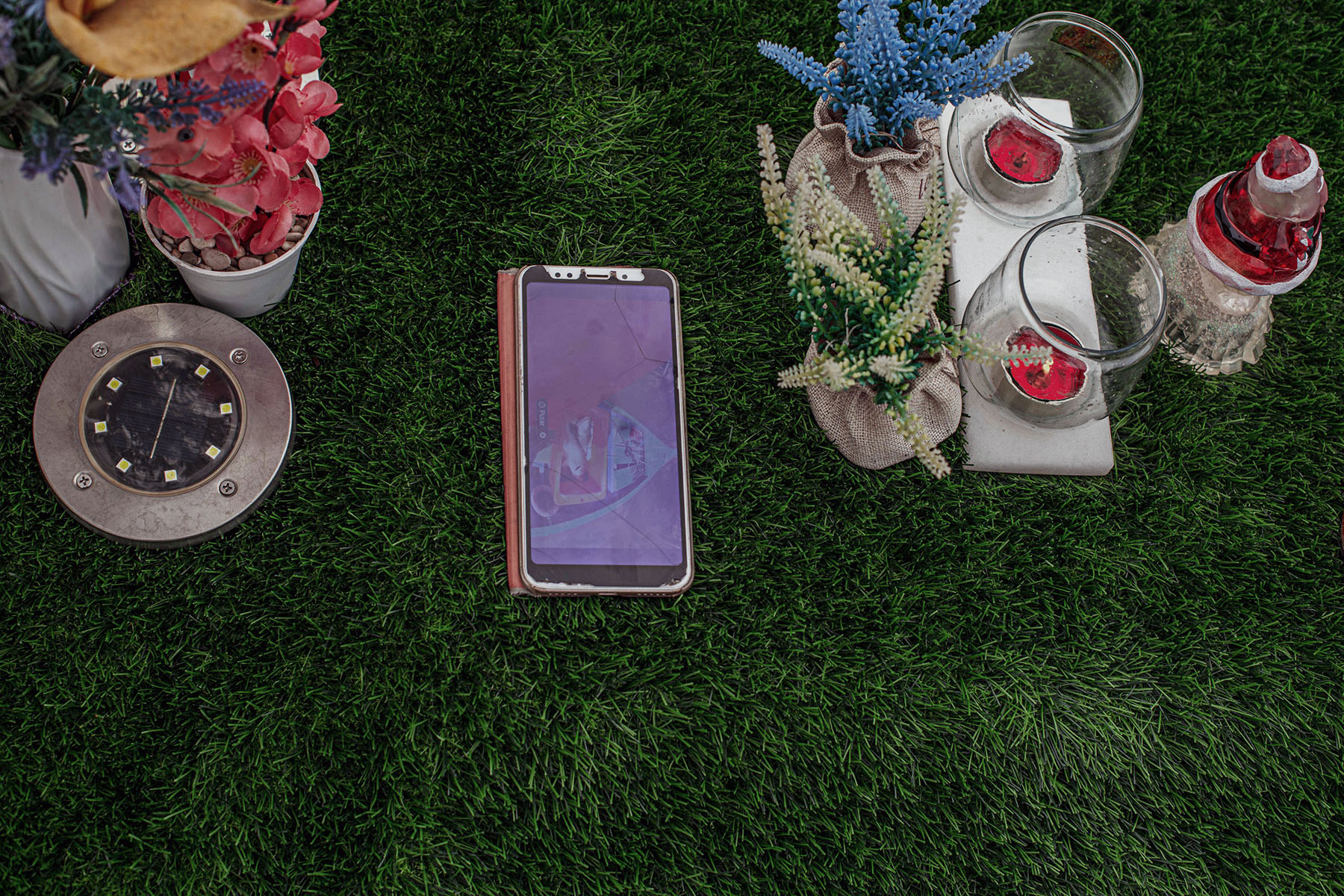
Their romance began in 2001, when D’andra was idly looking through a telephone book and noticed Eddy’s name.
“Maybe I just didn’t have anything else to do at that time, so I called him.”
She knew Eddy from university, as they had both studied at Hasanuddin University in Makasar. D’andra remembered herself as not a very social student and only had a few friends.
Eddy happened to pick up her call. They talked for a while and agreed to meet up near D’andra’s house on Jl. Latimojong in Makassar.
D’andra said she glanced hesitantly at the man who came out of the taxi, and Eddy looked like he was in just as much uncertainty. They didn’t greet each other.
At the time, Eddy was working as an internal auditor, which required him to frequently travel out of town. For a week after their first encounter, D’andra did not hear anything from Eddy. There was probably nothing much to expect, she thought to herself.
However, one night, her older brother told her that a man had come looking for her. D’andra had to resist the urge to jump when she saw Eddy. It was the first time a man who was not a childhood friend had come to visit her at home. Eddy then asked her to go for a walk with him.
“Since then, we started building a serious relationship. He made me feel comfortable and always fulfilled his promises. That was what made me so happy,” she recounted.
It was also her kind and patient husband who helped D’andra cope with her grief after she lost her mother in 2001. Her mother succumbed to a stomach condition after decades of suffering from periodic sharp pains. D’andra’s father had died when she was only 7 years old.
“All this time, I’ve thought of death as something frightening because I still want to be with that person,” she said.
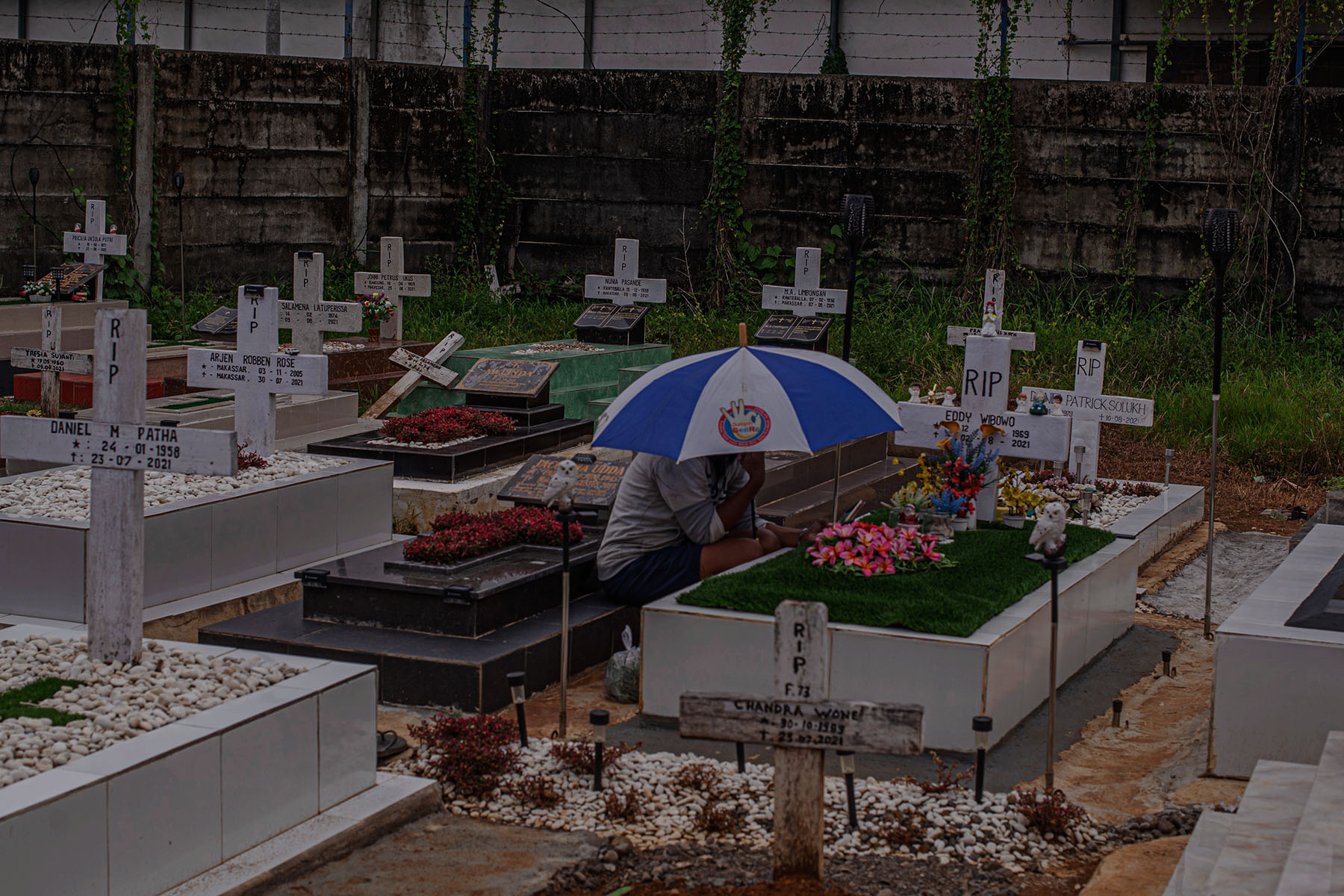
That day, under the glaring sun, D’andra was looking at the symbol of her lost husband under the shade of her umbrella. Her eyes looked swollen as she blinked her tears away. But no matter what, the wheels of time would keep rolling.
“When I lost my mother, the pain was profound. It turns out it was even worse when I lost my partner. In Christianity, when we tie the knot, we call ourselves two who have become one,” she said.
“Now, what? I’m alone. I’ve become only a half.”
Translated into English by Ardila Syakriah and edited by Prima Wirayani, volunteers and Kawan M. The piece was first published in Indonesian.

